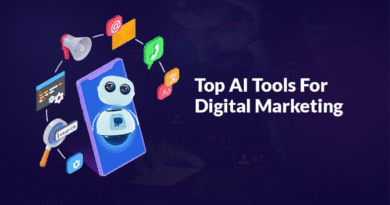Boosting Customer Support with AI: Tools, Use Cases & Best Practices
Customer support means the act of helping customers solve their queries or issues about a particular product or service. The professionals working in this department provide solutions and guidance to ensure customer satisfaction. Artificial Intelligence (AI) is prevailing in lots of domains, and it has positively influenced customer support as well. These systems understand, learn from, and also respond to customer queries around the clock. They resemble human interaction to provide an interactive experience. They free up human agents to let them focus on other complex tasks. This comprehensive guide discusses AI tools that streamline customer support, use cases, and best practices you can follow.
Table of Contents
Understanding the Role of AI in Customer Support
The technology enhances customer support in multiple ways. Let’s understand:
- AI-driven chatbots and virtual assistants can efficiently handle customer queries regardless of whether it is day or night. They ensure smooth communication and decrease the wait time.
- As per recent statistics Around 56% of the most advanced companies have intеgratеd AI into their customer services.
- Natural language processing (NLP) and machine learning allow AI systems to exactly understand the customer behavior and accordingly adapt the responses depending on past interactions.
- These systems promptly answer the common questions so that customers can get prompt solutions and do not need to depend on human agents.
- AI tools can predict customer requirements before they ask. Based on the customers’ usage patterns, these tools provide reminders, solutions, and tips.
- To let humans focus on complex tasks, AI helps live agents with tasks like summarizing previous chats, suggesting replies, and performing automatic routine tasks.
AI Tools That Improve Customer Support
Let’s get into the details of some of the well-known AI tools that help improve customer support.
1) Zendesk AI
Zendesk AI is best suitable for those companies aiming to provide comprehensive customer support. Its AI agents communicate with customers with personalized replies. Its platform boasts user-friendly navigation.
It reads customer messages and instantly creates support tickets to reduce manual work and save time.
After understanding the issue, it forwards the ticket to the right agent or team for a faster solution. It helps businesses prioritize tickets so that critical issues are handled first. The real-time translation support helps businesses deal with global customers without encountering language barriers.
2) Saufter
Saufter excels at automating repetitive tasks and providing self-service solutions. It offers smooth assistance over multiple channels (phone, live chat, and social media). Also, it keeps businesses informed about service quality and delivers practical alerts to handle the issues. SaaS companies can use Saufter to manage tasks like plan modifications, login issues, and bug reporting.
3) Intercom
Intercom supports real-time assistance and automation with its two main features, i.e., Fin and Copilot. Fin is the customer-facing chatbot that instantly handles common queries and emails. It speeds up response times and reduces ticket volume.
Another feature –Copilot summarizes conversations, drafts replies, and automates iterative tasks. As a result, it boosts agent productivity. Both these features help businesses optimize workflows and keep customers satisfied.
4) Tidio
Tidio’s customer support is quite useful to small and growing enterprises. Businesses can use their live chat feature, multichannel tools, and AI chatbots to seamlessly communicate with customers. It is a valuable tool for companies looking for better customer engagement and to save time with automated operations.
It allows checking who browses your website and accordingly sends automated messages. To assure client satisfaction, it can smoothly switch from chatbot to live human support. Besides, it integrates with tools like Google Analytics, Shopify, etc.
5) Gladly
Gladly is a comprehensive AI-driven customer service platform with pre-trained AI models. These models identify customers’ needs and provide personalized responses based on your brand’s tone. It automatically responds to customers’ queries.
It helps resolve requests related to refunds, returns, and cancelled orders. Using Gladly enables businesses to provide swift, tailored customer support because it combines all communication channels (email, chat, voice, etc.) into a single platform.
It employs a conversation-first approach that allows agents to go through a customer’s overall history across different communication channels.
6) Freshdesk
Freshdesk comes with the Freddy AI tool to streamline customer support. It has an AI agent that converses with customers and helps resolve their queries round-the-clock. Customers can also access the Copilot to get AI-driven insights.
It analyzes business data as well as carries out real-time sentiment analysis and accordingly personalizes interactions with customers. Also, it guides customers to the relevant team members and allocates tickets. Freddy AI can also assist businesses in refining their customer support by creating marketing campaigns.
Some of its outstanding features include:
- Omnichannel messaging
- Interactive analytics and insights
- Agent assistance tools for the team members
7) Sprinklr AI+
It is a kind of comprehensive tool for organizations looking for reliable AI customer support. It provides easy access to reports, article summaries, and smart insights. This kind of access can help a business better serve its customers. Its agent assistant tools provide swift access to customer details and knowledge base articles. This support helps accelerate the issue resolution and also makes each interaction more personalized and accurate.
It carries out detailed AI analytics to ensure an accurate outcome. Moreover, it instantly generates content based on the customized input.
Sprinklr AI+ allows organizations to build their custom AI bots that can adjust to different industries and niches. So, it becomes easy for your business to replicate the brand tone across different communication channels.
8) Kustomer IQ
The tool assists businesses in providing better customer support as it combines AI capabilities, data, and automation. Its built-in AI bots can handle common customer queries or frame an intelligent assistant through the “AI agent studio”. Businesses can use it to provide effective guidance and support when handling customer service tasks.
Additionally, Kustomer AI helps obtain deep data insights related to customers’ preferences, issues, and expectations. The tool’s AI solution is explicitly designed for voice interactions and supports natural language processing capabilities. The tool has provided customized transcriptions and summaries. You can even use it to create content for FAQs and knowledge bases.
9) Zoho Desk
What makes Zoho Desk a unique AI tool is that it comes with cost-effective plans. Its chatbot Zia can provide data insights, automate iterative tasks, and strengthen customer engagement. If an organization is seeking solutions for handling human resources, improving project management, reinforcing customer relationships, or automating market campaigns, then it is a good idea to consider Zoho Desk.
It also inspects the time when customers are most likely to revert to calls or messages. Accordingly, businesses can optimize their texting service or plan campaigns. The tool also supports real-time and past analytics, triaging solutions, and automation options for preparing workflows. Zia chatbot can directly respond to customer queries on websites and mobile apps.
One of the outstanding features is the sentiment analysis. It estimates the sentiment of each ticket and helps agents recognize the reason behind dissatisfaction among customers. Quick note-taking, content organization, and tailored shopping recommendations are a few more exceptional features of Zoho Desk.
10) Hiver
If your business intends to manage customer interactions across phone, email, and live chat, then Hiver can be a suitable option. Its AI assistant named ‘Harvey’ uses natural language processing to derive insights from customer conversations. Subsequently, it summarizes the discussions in notes that will help agents for further processing.
One of the outstanding aspects of Harvey is that it enables companies to track each instance of AI used in conversations, which helps meet compliance rules.
It can even help your business derive insights from conversations (across different channels) to map the customer journey. Swift content generation, holistic compliance controls, and email summarization are some of the noteworthy capabilities of Hiver.
Use Cases
AI-driven systems are used in different ways to help businesses keep customers satisfied. Here are the details of some of the common use cases.
1) AI-powered support for product inquiries
AI can help customer service teams by offering instant, tailored responses for queries related to products. It can inspect customer data, behavior, and preferences to provide the most relevant and accurate information. Let’s have an example to understand this. AI chatbots can communicate with customers to help them choose the most suitable products meeting their expectations, as per their browsing and purchasing history.
2) Voice assistants
The adoption of voice assistants like Google Home and Amazon Alexa has enabled AI technology to optimize the e-commerce customer experience. With voice commands, shoppers can order products, trace their orders, and even find answers to their queries. Some leading brands have collaborated with voice assistant services to have voice-command shopping. This allows customers to place orders online.
3) Swift resolution of issues
After analyzing customer inquiries, AI agents can generate tickets. With predictive analytics, AI can predict how urgent the ticket is and suggest the expected resolution time. This helps businesses prioritize the urgent tickets and accordingly allocate resources.
Additionally, AI-powered systems can accurately categorize tickets after evaluating the context and the content of the customer queries. As a result, the issues can be resolved promptly.
4) Live language support across borders
Businesses can now serve a global audience more effectively with AI because the AI tools simplify language translation in real-time. It is especially valuable for businesses working in diverse markets where language barriers can hinder communication.
AI agents use machine learning algorithms to translate the content of customer queries and responses in real-time. Hence, they ensure consistent support regardless of the language differences.
Best Practices
Businesses can follow these best practices when using AI systems to make their customer service more effective.
1) Use AI chatbots for prompt customer support
Chatbots are easily accessible and quite effective when it comes to customer service. For example, ChatGPT-powered bots can handle customer queries. They can instantly respond to questions around the clock and allow staff members to effectively handle complex or more essential issues.
Additionally, the contemporary AI chatbots are evolving into smart virtual agents. They can help customers with tasks like onboarding, troubleshooting, and tailored recommendations. They can learn from past conversations, analyze customer behavior, and escalate only when it is actually required. So, they have combined capabilities, i.e., providing human-like experience and automation.
2) AI analytics for deeper customer insights
AI-driven data analytics tools allow businesses to assess huge volumes of customer data to spot trends, customer preferences, and issues. This profound understanding helps companies explore ways to improve their services. The AI analytics follow these steps to provide deep customer insights.
- Identify key customer metrics (such as response time, customer satisfaction scores, etc.) and data sources (for example, feedback forms).
- Use tools like Google Analytics to automate the data collection and pattern recognition.
- Allows businesses to configure the AI tool to generate reports that summarize the relevant insights and suggest improvements.
3) Use AI recommendations to tailor experiences
Many companies are using AI-driven personalization engines to provide a tailored experience to each customer. They analyze customer preferences, browsing behavior, buying history, etc., to suggest the most suitable products. The personalized experience helps boost customer loyalty. It unlocks the opportunities that help businesses sell more by showing useful or better options. A tailored experience will help customers feel more valued and thus keep them satisfied.
Final Statement
Investing in an AI-driven system in customer support can benefit a business with improved response time, optimized workflows, reduced operational expenses, etc. AI tools revolutionize the way businesses deal with customers and let service teams work efficiently to keep customers satisfied. It is expected that the adoption of AI in customer support will evolve with time and make interactions feel more human-like.




